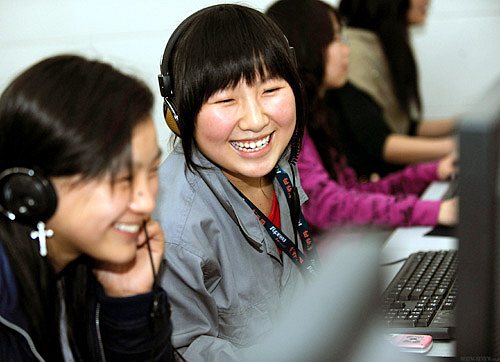|
 |
|
TAKING A BREAK: Teng Jiao (right), 18, a native of west China's Chongqing Municipality, surfs online at an Internet cafe after work in Fuzhou City, southeast China's Fujian Province, on March 4 (ZHANG GUOJUN) |
In China, they are called the new generation of migrant workers, those who were born after 1978 when the country started to implement the reform and opening up policy. They are considered pioneers who are shattering the existing urban-rural dichotomy. They come from rural areas, but are less acquainted with farming compared with the previous generation. They yearn for an urban life, but also fear it. They have a brand-new view of the times, but lack the corresponding identity and economic ability. They are labeled "a rootless generation," as some argue in a derogatory sense, but others praise them as the country's main labor force. For most urbanites, "home" probably means buying a house or starting a family, but for the new generation of migrant workers, it means tolerance, understanding and acceptance from the cities where they are now living.
At the beginning of 2010, the expression "new generation of migrant workers" first appeared in the No.1 Document issued by the Central Committee of the Communist Party of China (CPC) and the State Council.
According to Chen Xiwen, Director of the Office of the Central Rural Work Leading Group, around 60 percent of China's 150 million migrant workers were born in the 1980s or 1990s, referred to as the "new generation of migrant workers" in the document.
Not surprisingly, the new generation of migrant workers became a hot topic during this year's lianghui, namely the annual sessions of the National People's Congress (NPC) and the Chinese People's Political Consultative Conference (CPPCC), the country's top legislature and top political advisory body, respectively.
Everyone from NPC deputies and CPPCC members to ordinary people, including the new generation of migrant workers themselves, is thinking about their livelihood and development in cities as well as the various challenges and opportunities they face.
Enjoying a new lifestyle
"Usually, I'll go to the Internet cafe with friends as soon as I finish work," said Xu Ye, 20, a security guard.
A native of east China's Anhui Province, Xu looks younger than his real age. After finishing junior high school in his hometown two years ago, he found a job in Beijing, some 1,000 km away. His off-duty appearance looks as ordinary as those of local youngsters. The only difference, if any, might be the Anhui accent in his Mandarin.
Xu earns 1,400 yuan ($205) a month. The property company where he works offers only housing; meals are excluded. Xu said he has little money left over every month after deducting the cost of food, cigarettes and leisure activities.
Compared with the previous generation, which led a simple life—working hard during the day and doing nothing at night—the new generation of migrant workers like Xu enjoys a more colorful city life as they prefer to frequent Internet cafes or disco in their downtime. Dyeing one's hair and wearing trendy clothes are considered status symbols. Saving money, for them, doesn't seem important at all.
Notably, however, they are more than willing to get involved in every aspect of urban life, as they always talk about the city's hottest topics. The soaring cost of housing is one of them.
"Housing prices in Beijing are too high," Xu said expertly. "In the last year alone, the price per square meter in the residence complex where I work rose nearly 7,000 yuan ($1,024).
"How do I know? Look at that!" Xu said, pointing to a nearby real estate office with housing advertisements hanging in the window. "I watched prices slowly rise over the past six months.
"I can't afford to buy a house, and neither can university students," Xu noted.
Talking about his family, Xu said he had no intention to go back home and take up farming. "I didn't help my family cultivate land when I was a child, and I don't think I could do it now," he said, adding that given the choice he'd rather stay in the city to find a higher-paying job.
In Beijing, the new generation of migrant workers like Xu is leading a totally different life compared with the previous generation. On the one hand, they are reluctant to give up their present lifestyle because of the irresistible charms of the city. On the other hand, they have to cope with the same problems as their urbanite peers, such as employment, housing and skills development.
|
